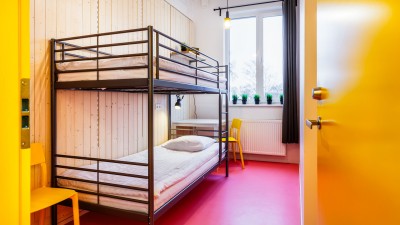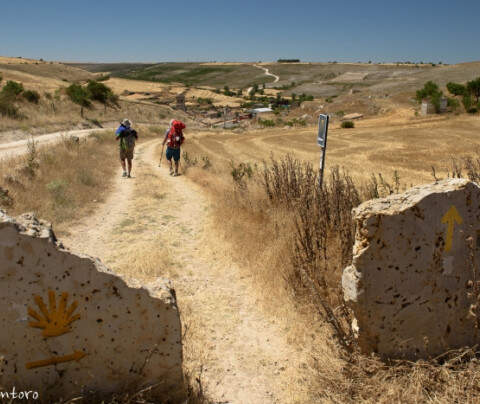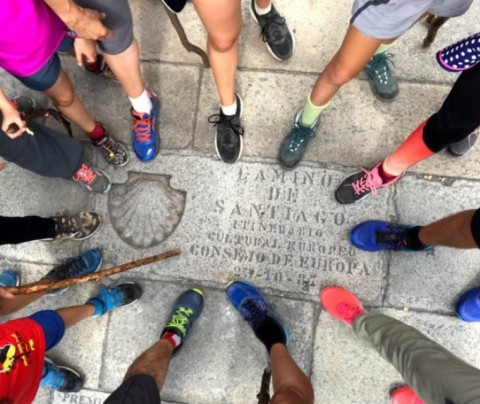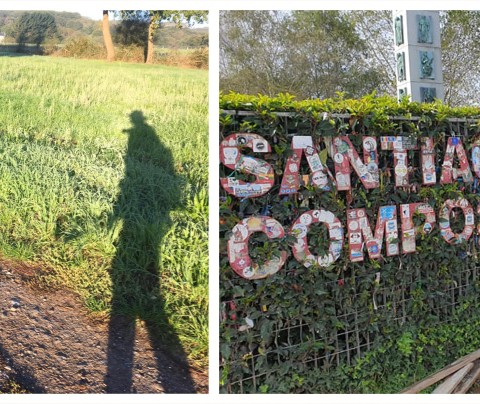Camino de Santiago and Covid-19

What will the Camino de Santiago be like after the coronavirus crisis? We still do not have answers but we will surely enjoy more of its people, its landscapes and its places. What we are convinced of is that the Camino de Santiago will be even safer. The hostels of the Jacobean Routes are working on this, hoping to become “safe hostels” for the pilgrim.
The Spanish Government is working on the implementation of a unique health protocol against Covid-19 that allows the hostels to reopen, preventing users from infection and protecting staff.
The Instituto para la Calidad Turística Española (Institute for Spanish Tourism Quality) - ICTE has thus prepared a guide with measures to reduce the spread of the coronavirus in hostels and hostels in Spain. This document does not refer specifically to the hostels on the Camino de Santiago but gives us clues of what it will be like to stay on the Camino after the coronavirus. We summarize some of the recommendations that it collects and that will allow us to return safely to the Jacobean Routes.
General protection measures in the hostel
The shelters must put in place a contingency plan to avoid contagion by coronavirus among hostal workers and pilgrims. These protocols, which each accommodation will design according to their needs, must comply with a series of basic security measures that we summarize in three points.
- Guarantee the safety distance. It is recommended to guarantee the minimum established distance (1.5 - 2 meters) between employees, customers and employee-customers, redistributing the spaces of the facilities and organizing the movement of people. A capacity control will be established if necessary.
- Hand washing and individual protection measures. The accommodations must organize staff shifts to guarantee the safety distance, provide the necessary individual protection elements (gloves and masks, for example) and promote proper hand washing. Hydroalcoholic solutions will be provided in all rooms for customers.
- Correct ventilation and disinfection. Cleaning and disinfection frequencies will be increased, especially in shared use areas, showers and toilets; as well as in the areas of greatest contact (surfaces, knobs, taps, keys / cards ...). In addition, adequate ventilation will be guaranteed in all areas of the hostel.
The ICTE also details a whole series of more specific measures for each of the areas that the hostel has.
We remind you that the capacity of these premises during de-escalation is limited according to the phase in which each territory is. In the provinces with better conditions, the maximum capacity will be, in any case, 50%. The opening of the common areas is also conditioned to the phase change of each territory. You can consult all the information about the de-escalation in our article The Camino de Santiago and Covid-19.
We will detail the different security recommendations according to the hostel facilities:
Reception at the hostel
- Greeting without physical contact. Greeting with physical contact, including shaking hands, will be avoided for both staff and customers.
- Disinfection measures. In the reception and reception area, you should make a disinfecting solution for hands and a disinfecting spray for shoes, backpacks, bicycles, etc. In addition, it is recommended to place disinfecting rugs at the entrance of the establishments.
- Keep the safety distance. The hostel must guarantee the minimum established distance. If it is not possible to keep it between staff and customers in the reception area, physical elements such as a protective screen must be installed, easy to clean and disinfect, or a mask must be used. In addition, distance markers will be visibly placed between clients to avoid crowds and guarantee the minimum safety distance.
- Booking, online checking and card payment. The guide is committed to facilitating online booking and checking, card payment or other electronic means, preferably contactless to avoid unnecessary contact.
- No brochures or printed documentation. In the facilities of the shelters any decorative element will be avoided, as well as placing brochures or other type of informative materials. It is advisable to provide the information online.
Single and shared rooms
- Gel and disinfecting mats. Hydroalcoholic solutions must be available in the rooms. It is also recommended to install disinfecting rugs at the entrances of the rooms.
- Safety distance between beds and bunk beds. The hostel must reorganize the arrangement of beds and bunk beds to guarantee the minimum safety distance, as well as guarantee the maximum capacity allowed.
- Individual lingerie. In shared rooms, the hostel will provide bagged or packed sheets and blankets. It will be the pilgrim himself who must make his own bed and instruct him to avoid touching beds or bunk beds of other clients
Commonly used toilets and showers
- Disinfectant solution. As in the rest of the hostel rooms, the pilgrim will be able to find a dispenser with disinfectant solution.
- Individual soap and paper dispensers in the toilets.
- Avoid using mats or other common textile elements.
- Use of appropriate footwear.
- Shift control to avoid crowds and respect the safety distance.
Kitchen and dining room
- Shared kitchen. Disinfection of the household items, equipment (refrigerators, microwaves, etc.) and of the space must be guaranteed after each use. In case it cannot be guaranteed, it must remain closed.
- Dining room turns. A control of the dining room capacity must be established to guarantee the safety distance.
- Hygiene gel. As in the rest of the rooms, the pilgrim will have disinfecting gels to facilitate proper hand hygiene.
- Disposable kitchenware. Both cutlery and plates and tablecloths.
- Prioritize monodose. Any decorative element, shared menus, and self-service products (napkin rings, toothpick holders, cruets, oil cans, etc.) will be removed from the tables, prioritizing disposable monodose.
- The buffet system is not recommended.
Commonly used areas
- Disinfectant solutions. The hostel must have disinfecting solutions in the places of passage and in those facilities most used by customers.
- Litter bins with non-manual action. The bins must have a non-manually operated opening and have an inner bag.
- Products and belongings left by customers who leave the hostel will be discarded.
- Withdraw brochures, books or guides to guarantee hygiene and security measures. If this is not possible, the hostel staff must manage its use by informing the client of the need for hand disinfection before and after their consultation.
- Safety in the use of the vending machine. Disinfectant solution should be provided or the client should be encouraged to wash their hands before and after use.
Backpack transportation
The backpack transport service on the Camino de Santiago will continue to be active after the Covid-19 crisis, maximizing hygiene and safety. To do this, shelters must establish a series of measures:
- Left luggage / warehouse. In case the hostel has a place to leave the backpacks, this will be an intensive disinfection area and will have disinfecting solutions.
- Backpacks in plastic bags. The hostel must avoid direct manipulation of clients' backpacks and other belongings. It is recommended to offer plastic bags or similar to customers in which they can deposit their backpacks, boots or poles.
In addition to the measures taken at the hostel, Correos’ Paq Mochila will increase its security measures and facilitate the online booking of the service:
- Hygiene and disinfection of the transport vehicle. In addition to the measures taken at the hostel, Correos will guarantee the user of its backpack transport service compliance with strict safety regulations. Thus, the postman in charge of the delivery will be provided with the necessary individual protection measures (mask and disposable latex gloves) and will have disinfecting solutions to clean their hands and the vehicle.
- Online hiring of the Paq Mochila. Correos’ backpack transportation service can be hired on the web as before, ensuring secure online payment (by credit card or Paypal). This way, you can avoid unnecessary contact with envelopes present in shelters or with cash, as established in the guidelines of the ICTE guide.
Your email address will not be published.
Mandatory fields are marked with *






